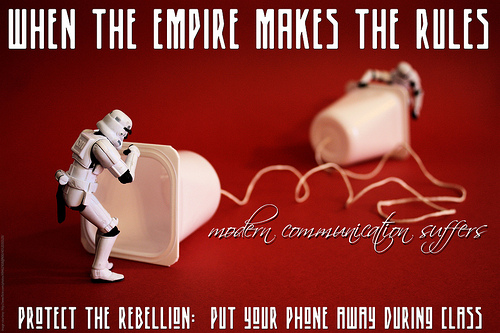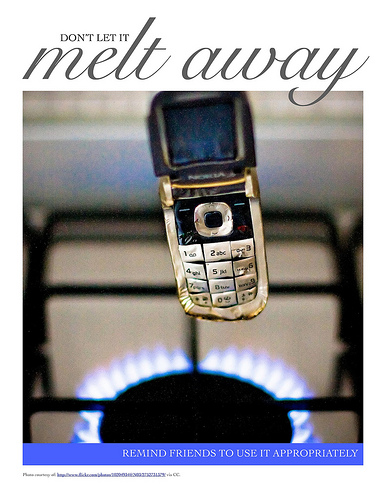The “no-campaign” campaign
These images were created as part of an “appropriate use” campaign concerning mobile devices at my school. Truth: It’s not much of a campaign at this point. In fact, I’ve just been throwing these things out there in hopes that something will stick to someone who cares. I mean, I’d like to see these posted in key spots around our school, but this isn’t my battle to win or lose. Frankly, if our staff decides to go back and ban all student cell phone access during the school day, then so be it.
Really, can my students grasp the structure and function of carbohydrates? How many “F’s” do my advisement students have this week? Can I skillfully facilitate a debrief of Monday afternoon’s collegial visit with two of my colleagues to a classroom across town? Really… those are the pressing issues for me. Someone else can decide whether or not we go back on an experiment within our building.
History
Our school allows limited use of cell phones during the school day. Students may use phone before school, after school, at lunch… even between passing periods. Instructional time, however, is considered sacred. Instructors may also allow access during a lesson if the use of mobile devices is instructional in nature. otherwise, phones must be kept off and out of sight during time in class.
That said- for some reason, a debate rages anew this school year where many faculty members want an outright ban on all mobile devices: cell phones, smartphones, iPods and other .mp3 devices, etc. A current bogeyman seems to be the threat of drugs being hidden in cellphone cases. Really? As if those particular hidden spaces were somehow more magical than boots or bras.
Just perhaps
I would argue that giving away all legal access to phones will only push cell phone use into the hands of the “criminals.”* I believe chasing down cell phones is a costly battle to fight in terms of teacher and administrator resources. I would suggest that our administrators and teachers have far better things to spend their time on… things that directly impact instruction, content learning and the overall management of a school. Turning our staff into the “cell phone police” will only turn the focus of our building away from improving instruction.
Inappropriate use of cell phones in schools is not a technology, nor a safety issue. Inappropriate use of cell phones is a management issue… much like passing notes or catching a nap during a lecture.
In my opinion, throwing out cell phone access during the day is to throw out one of the more powerful and relevant tools for teaching responsibility and appropriate use. If you want your city populated by rude people who possess zero cell phone etiquette- put a complete ban on phones in schools. School is a formal educational setting. Therefore, school is a perfect place to learn and practice appropriate adult use of these tools. It’s not rocket science… to me.
Contrary to what some folks have mentioned, I don’t actually see this as an instructional issue. I think very little instructional use of mobile devices is actually going on. Sure, I use Polleverywhere in class. Sure, I advocate whipping out a smartphone pretty frequently to run down a piece of trivia I can’t answer myself. But really… this isn’t about whether or not our classroom uses of mobile devices are instructional or not. Do many teachers use cellphones in an instructional manner? The answer is no. However, to me, a ban will make certain that we never hone the skills to help students utilize mobile devices in education. Among other things, I think it is an issue of vision. I actually think too much time connected to digits will melt your brain in some way. I’m forty years old. But does this mean we should further alienate ourselves from a new generation? If I’m not mistaken, I think we’re going to need them.
These posters were made as friendly reminders to be put up around the school. We could all use a reminder now and again, right? I guess the only thing that would bother me with regard to an about-face in policy is that we’ve never provided any solid instruction. We’ve never really said: “this is what it looks like when done correctly.” We’ve assigned “appropriate use” (with consequences for not doing so) … as opposed to taught “appropriate use.” We’ve never made an attempt to educate our students. We just hoped they’d comply with our ethereal wishes. Wait- aren’t we the professionals in the area of education? Can’t we do better than this if we try?
What is “fair?”
In my classroom, I’ve always tried to follow an idea I remember taking away from a Todd Whitaker talk from a few years back. In Whitaker’s book, What Great Teachers Do Differently, he asks administrators to consider the question, “What will the best people think?” prior to making any decision. He also advocates doing the same with regard to our students in the classroom. He makes the case that if we constantly make decisions via the lowest common denominator, we ultimately risk alienating the best of those around us.
Do we really want students who display model behavior and etiquette to suffer at the hands of those who do not? Wherever you are, ask yourself who runs the place.
In related news
Have you seen Wifitti? This is a pretty cool little web service that allows a digital bulletin board of sorts. Participants can either send a text message to add a thought (or image!) or reply by typing directly via the web link. I recently added one to our school’s wrestling network. This app certainly won’t make photosynthesis any simpler… but it is fun. That’s all I’ve got on this one. I’m battleworn.
Thank you, drive through………..
*I think that marks the first and only time I’ve personally used an NRA mantra in an argument. I feel the need to shower.
Artwork
All posters were created by me using CC artwork from Flickr. The original images are explicitly credited on each page of the set. Printable sizes are available for each..



Seriously, cell-phone cops? Drugs in the phones? Teachers, let’s not confuse school with secure custody – an unfortunate though understandable mix-up in the mind of the student. Teachers, are you a “guardian” of your students’ education or a “guard”?
Ian Jukes on handheld devices:
“…by the year 2005 such devices will be as common and transparent as pencils. However, unlike pencils, these devices will be able to communicate effortlessly with all of the other devices that are also out there.”
http://www.ianjukes.com
Okay, so what then? Adjustment is not an option or a luxury as some would have it.
Two good quotes here even aside from the one by the Committed Sardine himself:
“Teachers, are you a ‘guardian’ of your students’ education or a ‘guard?'”
-and-
“Adjustment is not an option or a luxury.”
Thanks for this.
I really think the desire to serve the “lowest common denominator” is palpable in many fields, not just education. However, having it be so apparent and yet having few tools (besides words, and those are REALLY effective, right?) to fight it can be and has been exhausting.
For instance, let’s consider an area that might be considered a “management issue” in the library. Solutions? 1. Rearrange furniture and make the place look odd OR 2. Manage the area. Which is easier? Which is preferred by a majority of the interested parties? Which is the solution of least resistance? No-brainer for sure.
The same can be said for instruction and resources. If we build an educational system around satisfy the LCD, why are we not surprised by society today? If we buy the books that are below reading level to satisfy the LCD, how do we explain a lack of money for AP-level reading materials for the HCD (highest common denominator)? And if this satisfaction of the LCD happens on a large enough scale (as in a school building), why are we not surprised by the lack of motivation, passion, and energy we see in faculty and staff?
To continue with the apropos Star Wars theme, I think quoting Master Yoda would be wise at this time: “Do, or do not. There is no try.” Is it time to keep talking or is it time to act?
I used to use that Yoda quote as a wrestling coach.
I think perhaps the answer lies in vision… and then in marketing and revisiting that vision. I think it is clear that a consensus doesn’t own every element of our vision of the future. That’s a problem. That’s the part of this that I own a bit of. So there is certainly room for improvement there.
Create the vision. Articulate the vision. Live the vision. What is our vision?
If our students were engaged in learning, they wouldn’t be bothering with text messages. If we were engaged in instructional opportunities that challenged the students and ourselves, we wouldn’t have time to worry about cell phones and what might be hidden in them. So, yes, it’s a classroom management, but it’s also an instructional design issue.
I could go on and on about why/how we need to be teaching appropriate cell phone use, but I know I’d be preaching to the choir.
Preach on, Carolyn. I may be in the choir on this one, but there are tons of folks reading this who aren’t necessarily. That I know for sure.
Instructional design. Absolutely. I couldn’t possibly agree with your first paragraph any more than I currently do.
You can bring that sort of honest realism about the classroom environment to this party any day. Thank you.
Like you, I agree that educational time is sacred. That said, I teach at the community college level where one could argue that it is up to students who are paying for their educations as to whether or not they want to pay attention during class. I don’t allow for this argument. It is too easy for my students to slide onto Facebook instead of engage with other students. I have 50 minutes 3x a week with these people, and I need to have their attention. In mind, asking them to turn off their electronics is simply a matter of civility and respect – and I present this matter to them on the first day.
I will add that my 5th grader has been on the receiving end of some cyber-bullying this year, which has been miserable. I imagine IF he had a device with text and IF this person had his cell number, the cyber-bully might have bugged my son during the day. These posts were nasty, cruel and some were downright threatening. We dealt with the school with the matter with great success. My point here is that I think you said that inappropriate use of technology is a classroom management issue, not a safety issue. I guess I would argue it could be both.
As you say yourself, our kids are so plugged in, so computer savvy why do you feel they need to be further plugged in to their own personal devices? Why do students need to be texting during the day? Shouldn’t they be focusing on their studies rather than their social lives? Doesn’t this create less responsible kids and enable helicopter parents? (“Oh, I’ll just call my mom. . .”). I don’t know, I’m just wrestling with these things on my own blog. Glad I found you.